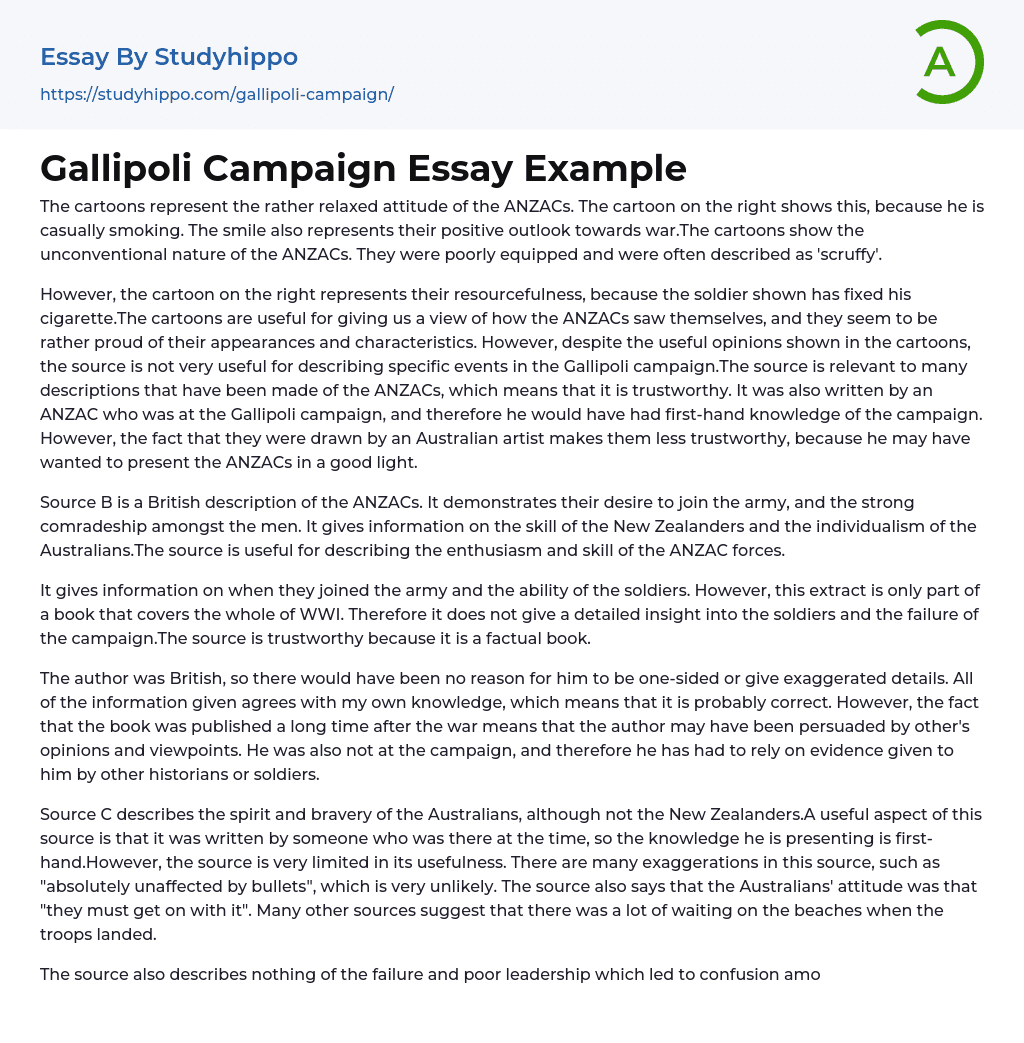The ANZACs' laid-back demeanor is depicted in the cartoons, with the one on the right showing a soldier smoking in a carefree manner. Their optimistic attitude towards warfare is seen through the smile on the soldier's face. Additionally, the cartoons showcase the ANZACs' unorthodox ways, given their reputation for being under-equipped and looking unkempt.
Although the cartoons may not be useful for describing specific events in the Gallipoli campaign, they provide a glimpse into how the ANZACs perceived themselves and their resourcefulness, as depicted in the soldier fixing his cigarette. Despite the potential bias of the Australian artist who created them, the cartoons are relevant and trustworthy as they were written by an ANZAC with first-hand knowledge of the campaign.
Source B originates from Britain and depicts the ANZACs as being eager to enlist in the army, whil
...e also highlighting the close companionship amongst the troops. It also provides insight into the proficiency of the New Zealanders and the independent nature of the Australians. This source serves as a valuable reference when describing the enthusiasm and capability of the ANZAC forces.
The provided information pertains to the joining date and capability of soldiers, but this is just a portion of a book encompassing all of WWI, thus lacking in-depth analysis of soldiers and campaign failure. The factual nature of the source fosters trustworthiness.
Being British, the author had no motive for bias or exaggeration in the information provided, which aligns with my own knowledge, leading me to believe it is likely accurate. Nonetheless, as the book was released long after the war, the author might have been influenced by others' views and perspectives. Additionally, since h
was not present during the campaign, he had to depend on data given by other historians or soldiers.
While Source C focuses solely on the bravery of Australian troops and excludes any mention of their New Zealand counterparts, it possesses the advantage of being a first-hand account from someone who witnessed the events. However, its reliability is limited due to multiple exaggerations within the text, such as the unlikely claim that soldiers were impervious to bullets. Furthermore, this source suggests that Australians displayed a "get on with it" mentality in contrast to other sources reporting extended periods of idleness after landing on the beach.
According to the source, there is no information provided about the ANZACs' confusion caused by failure and poor leadership. No specific event or dates are mentioned. The source appears to be an opinion and therefore less reliable than factual evidence. Overall, its trustworthiness is questionable.
The exaggerated nature of source A may be due to Australian war correspondent Charles Bean's desire to glorify the skill and bravery of the Australian soldiers. However, source B is considered more valuable for describing the role of ANZAC soldiers at Gallipoli. It is less exaggerated and more objective, offering specific details such as a date and a quote from an ANZAC soldier.
- Culture essays
- Social Control essays
- Citizenship essays
- Social Justice essays
- Caste System essays
- Social Responsibility essays
- Socialization essays
- Deviance essays
- Modern Society essays
- Popularity essays
- Civil Society essays
- Community essays
- Female essays
- Filipino People essays
- Igbo People essays
- Indigenous Australians essays
- Indigenous Peoples essays
- Minority Group essays
- Social Institution essays
- Men essays
- The nation essays
- Middle Class essays
- Social Norms essays
- Discourse Community essays
- Popular Culture essays
- Car Culture essays
- American Culture essays
- Mormon essays
- Indian Culture essays
- Mexican Culture essays
- Pop Culture essays
- Cultural Differences essays
- Culture Shock essays
- Different Cultures essays
- World War I essays
- World War Ii essays
- Atomic Bomb essays
- American Civil War essays
- Attack essays
- Cold War essays
- Crimean War essays
- Emilio Aguinaldo essays
- Iraq War essays
- Korean War essays
- Nazism essays
- Nuclear Weapon essays
- Philippine Revolution essays
- Trench Warfare essays
- Vietnam War essays
- Western Front essays




